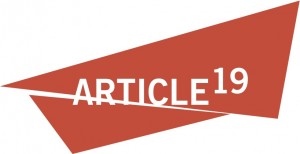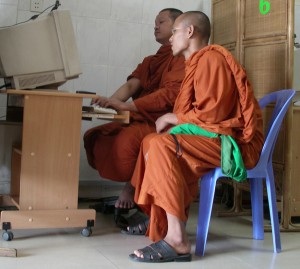Proposed cyber law threatens free expression in Cambodia
In Cambodia, most media outlets firmly toe the government line. But one area where Cambodians can express themselves freely and receive and share unbiased information is on the Internet. However, a bill drafted in secret by the ruling party could put an end to that. For this year’s World Press Freedom Day, Kyle James examines the possible new restrictions that have press freedom advocates very worried, and possible reasons the government is getting strict.
Here in Cambodia, the media largely fails to fulfill its duty to keep a check on those in power. All local television stations are either in direct government hands or owned by people with close ties to the ruling party. TV news here is filled with footage of officials giving speeches or inaugurating new projects. News about the serious problems plaguing this country of 15 million, such as corruption, forced evictions, land grabs and rampant deforestation, never make the broadcast.
Newspapers are also by and large in the government’s pocket. Radio, too, although there are a few independent stations, but with limited reach. For years, that served the authoritarian government’s interests well. But now, officials perceive a growing threat to their near monopoly on information: the internet.
Until fairly recently, few people in Cambodia, relative to the population, had internet access. It’s a poor country, and 80 percent of the population lives in the countryside. Many are not even on the national electricity grid. But things have begun to change, rapidly. With the advent of cheaper smartphones, better 3G mobile coverage and Facebook, Cambodians have been getting online in droves, especially the younger generation. In 2010, 320,190 were online, according to the Ministry of Post and Communications. Last year, it was 3.8 million.
In 2011, according to Kounila Keo, probably the country’s best-known blogger, people started sharing info online—news and videos of traffic accidents, land grabbing incidents, protests, etc. These were the kinds of things they wouldn’t see in the media. Then, in 2013, the country’s most popular social media site, Facebook, “blew up with information, videos and texts about events,” Kounila said. “Some people even joke that TV, radio, newspapers belong to the government or companies while Facebook belongs to the people.”
This spooked the government, especially since the social media crowd tends to support the political opposition, which was enjoying unprecedented popularity. Young people used online tools to mobilize, campaign, and openly express criticism that would have been only discussed in private just a few years earlier.
The phenomenon appeared to take the government by surprise. And the ruling party, the CPP, suffered its worst setback in years and the first real challenge to its iron-fisted rule.
Vague provisions, stiff penalties
Last month, the London-based freedom of expression advocate Article 19 got hold of a leaked copy of a draft Cambodian cybercrime law. The government had said back in 2012 it was planning such legislation, but it would not release any information to the public, nor consult with outside experts or NGOs.
 If this current draft is signed into law, it looks as if one of the last windows of free expression Cambodians have left could slam shut.
If this current draft is signed into law, it looks as if one of the last windows of free expression Cambodians have left could slam shut.
Most worrying to observers is Article 28, which contains a long list of criminal offenses. For instance, content deemed to generate “insecurity or instability” is punishable by one to three years in jail and a fine of up to $1,500, a very large sum in this developing country. Publication of content that slanders or undermines “the integrity of any governmental agencies or ministries” carries a similar penalty, as does posting something that “damage[s] the moral and cultural values of society.”
The jail terms for these transgressions are the same as those stipulated for producing or distributing child pornography.
“The law is vague and it challenges and criminalizes legitimate forms of online expression that, for example, might challenge corruption or wrongdoing by authorities, or are simply critical of the government,” David Diaz-Jogeix, director of programs at Article 19, told me from London.
Concerned journalists
His concerns are shared by several Cambodian journalists I spoke with.
“I think the draft bill will affect the online freedom of expression,” said Sun Narin, a reporter at the independent Voice of Democracy radio and a stringer for Reuters and the Wall Street Journal. “I am so worried about Article 28, which will affect the work of journalists. They will not dare write about sensitive stories.”
Suy Heimkhemra, who reports for the VOA Khmer service, says the law will make his job much harder and will hurt information sharing in general. “Everyone is scared that the law will cause them trouble when they post something sensitive,” he said.
Kimsay Hor, who reports for the Phnom Penh Post, says social media like Facebook and YouTube exploded in popularity and often had information critical of the government. “So the government is trying to keep control of these popular social media tools [with this law],” he wrote.
Advocates for freedom of expression are calling on the government to stop the draft’s progress and open up a series of public consultations for amendments. But few think the government will agree to that. Secrecy and closed-door decisions are the norm for the government of Prime Minister Hun Sen, who has been in power since 1985. Calls and emails to the government to comment on the draft for this post went unanswered.
It’s not clear when the draft law could go to the National Assembly and become the law of the land. The government, as so often is the case, is keeping mum. But many suggest it could be this year, perhaps even this summer.
If it does enter the law books, Chak Sopheap of the Cambodian Center for Human Rights, says the space for free expression in the country will become a lot smaller. “The draft law is clearly aimed at cracking down on critical voices.”
Author: Kyle James






